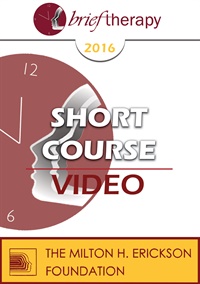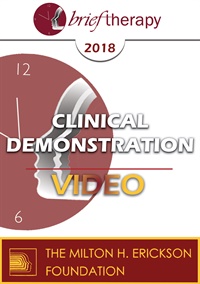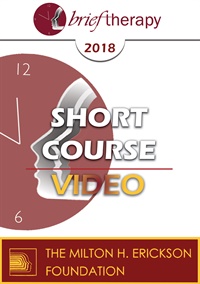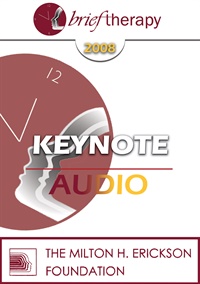
- Average Rating:
- Not yet rated
- Topic Areas:
- Keynotes | Brief Therapy | Affective Science | Belief Systems | Meditation, Spirituality and Yoga | Mindfulness | Positive Psychology
- Categories:
- Brief Therapy Conference | Brief Therapy Conference 2008
- Faculty:
- Joan Borysenko, PhD
- Duration:
- 59:33
- Format:
- Audio Only
- Original Program Date:
- Dec 12, 2008
- Short Description:
- Science and spirituality meet in this keynote. Drawing on her background as a cancer cell biologist and her work in behavioral medicine, Borysenko explores intuition, positive emotions, contemplative practice, and what she calls the “soul’s compass.” Blending neuroscience, story, and guided reflection, she invites therapists to consider guidance not as dogma, but as an embodied experience of presence, love, and aliveness that can orient both clinical work and personal life.
- Price:
- $15.00 - Base Price
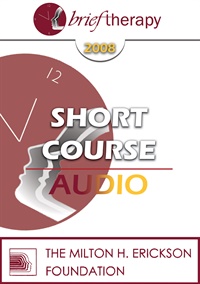
- Average Rating:
- Not yet rated
- Topic Areas:
- Short Courses | Addiction | Brief Therapy | Habits | Mind-Body | Mindfulness
- Categories:
- Brief Therapy Conference | Brief Therapy Conference 2008
- Faculty:
- Mary Augustyn, MS
- Duration:
- 1:16:00
- Format:
- Audio Only
- Original Program Date:
- Dec 11, 2008
- Short Description:
- Stop-Breathe-Focus (SBF) diffuses volatile situations, interrupts addictive/compulsive behaviors, resolves conflicts, facilitates healthy decisions and changes problematic behavior. SBF is useful to make changes quickly, to autopsy previous behaviors and to create a plan for behavior change; all in a simple, easy-to-use package.
- Price:
- $15.00 - Base Price
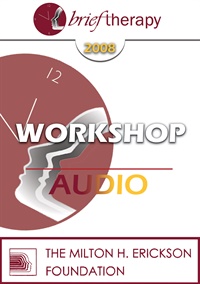
- Average Rating:
- Not yet rated
- Topic Areas:
- Workshops | Children and Adolescent Therapy | Brief Therapy | Meditation, Spirituality and Yoga | Mindfulness | Strengths-Based
- Categories:
- Brief Therapy Conference | Brief Therapy Conference 2008
- Faculty:
- Matthew Selekman, MSW
- Duration:
- 2:34:38
- Format:
- Audio Only
- Original Program Date:
- Dec 11, 2008
- Short Description:
- Adolescent self-harming behavior is on the rise and is one of the most challenging presenting problems school professionals, healthcare providers, and therapists will face in their clinical practice settings. In this "hands-on" practice-oriented workshop, participants will learn several distress management tools and strategies to strengthen the adolescent's self-soothing and coping capacities and family connection building rituals and therapeutic experiments to foster closer and stronger parent-adolescent relationships. Parent management skills for constructively responding to their adolescents' inevitable self-harming slips will be presented.
- Price:
- $15.00 - Base Price
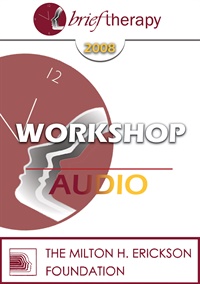
- Average Rating:
- Not yet rated
- Topic Areas:
- Workshops | Mindfulness | Acceptance and Commitment Therapy (ACT) | Brief Therapy | Therapist Development
- Categories:
- Brief Therapy Conference | Brief Therapy Conference 2008
- Faculty:
- Steven Hayes, PhD
- Duration:
- 2:40:20
- Format:
- Audio Only
- Original Program Date:
- Dec 11, 2008
- Short Description:
- Mindfulness and acceptance methods are powerful methods in clinical practice that greatly simplify the therapeutic tasks at hand. Acceptance and Commitment Therapy (ACT) will be described as an example of these methods and specific techniques will be shown. ACT targets common core processes that research are the basis for much psychopathology or restrictions on psychological health.
- Price:
- $15.00 - Base Price
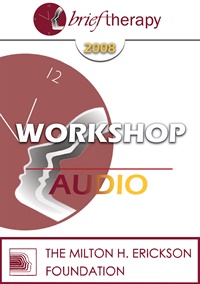
- Average Rating:
- Not yet rated
- Topic Areas:
- Workshops | Brief Therapy | Mindfulness | Psychotherapy | Meditation, Spirituality and Yoga
- Categories:
- Brief Therapy Conference | Brief Therapy Conference 2008
- Faculty:
- Joan Borysenko, PhD
- Duration:
- 2:03:07
- Format:
- Audio Only
- Original Program Date:
- Dec 12, 2008
- Short Description:
- Change can feel like exile, collapse, or an unexpected invitation. In this experiential workshop, Borysenko weaves Viktor Frankl, anthropology, archetypal psychology, and mindfulness into a practical framework for navigating “the place between no longer and not yet.” Through meditation, inquiry, and dialogue, participants explore resilience, trust, and the inner resources that allow loss to become transformation rather than despair.
- Price:
- $15.00 - Base Price
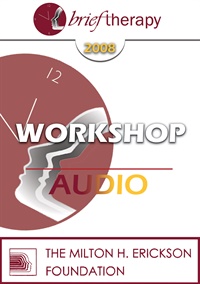
- Average Rating:
- Not yet rated
- Topic Areas:
- Workshops | Generative Psychotherapy | Brief Therapy | Buddhism | Meditation, Spirituality and Yoga | Mindfulness | Psychotherapy
- Categories:
- Brief Therapy Conference | Brief Therapy Conference 2008
- Faculty:
- Stephen Gilligan, PhD
- Duration:
- 2:43:38
- Format:
- Audio Only
- Original Program Date:
- Dec 14, 2008
- Short Description:
- The challenge of personal transformation is faced differently in the East and West. Typically, Eastern meditation emphasizes how to cultivate higher states of consciousness that "go beyond" ego identifications, while Western therapy focuses on how to "work through" problematic states. This workshop explores an integrative model that suggests how to use both approaches in a complementary way: sometimes "transcending, sometimes "transforming", and often doing both at the same time. The connection between meditation, generative trance, and selfrelations will be a central focus.
- Price:
- $15.00 - Base Price
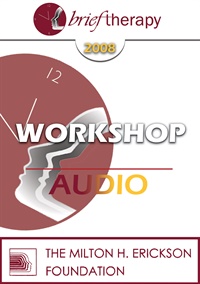
- Average Rating:
- Not yet rated
- Topic Areas:
- Workshops | Mindfulness | Acceptance and Commitment Therapy (ACT) | Therapeutic Relationship | Brief Therapy | Therapist Development
- Categories:
- Brief Therapy Conference | Brief Therapy Conference 2008
- Faculty:
- Steven Hayes, PhD
- Duration:
- 1:46:28
- Format:
- Audio Only
- Original Program Date:
- Dec 14, 2008
- Short Description:
- The evidence that the relationship matters in psychotherapy is vast, but that knowledge is of limited usefulness until it is known how to create powerful therapeutic relationships. The relevance of the Acceptance and Commitment Therapy (ACT) model to this issue is described, and specific methods are described and shown that can increase the potency of the therapeutic relationship.
- Price:
- $15.00 - Base Price
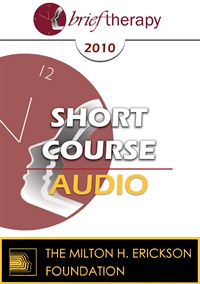
- Average Rating:
- Not yet rated
- Topic Areas:
- Cognitive Behavior Therapy (CBT) | Depression | Short Courses | Mindfulness | Attention Deficit Disorder (ADD)
- Categories:
- Brief Therapy Conference | Brief Therapy Conference 2010
- Faculty:
- Joseph Sestito, MSSA, LISW-S
- Duration:
- 1:29:31
- Format:
- Audio Only
- Original Program Date:
- Dec 09, 2010
- Short Description:
- The basics about mindfulness and cognitive-behavioral therapy will be explained, along with the research findings which show that aerobic exercise helps both ADD and depression through improving brain functioning. Participants will become acquainted with ten mindfulness skills, four CBT methods and five types of aerobic exercise which can help their clients. Participants will see how they can be the instruments who help their clients deliver themselves from distraction to distinction. With Joseph Sestito.
- Price:
- $15.00 - Base Price
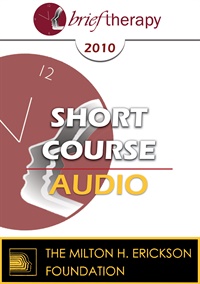
- Average Rating:
- Not yet rated
- Topic Areas:
- Short Courses | Meditation, Spirituality and Yoga | Mind-Body | Mindfulness | Multicultural | Belief Systems | Psychotherapy | Brief Therapy
- Categories:
- Brief Therapy Conference | Brief Therapy Conference 2010
- Faculty:
- Jeanne Hernandez
- Duration:
- 1:38:23
- Format:
- Audio Only
- Original Program Date:
- Dec 09, 2010
- Short Description:
- This workshop explores how the Indian belief system contains ingredients to keep the mind and body in harmony and promote wellbeing. We will explore adding into psychotherapy sessions totem strengths, shaman journeys, medicine wheels, time-frames, respect and gratitude; the circle of life, and symbols as reminders of the “right” path. With Jeanne Hernandez.
- Price:
- $15.00 - Base Price

- Average Rating:
- Not yet rated
- Topic Areas:
- Trance | Workshops | Mindfulness
- Categories:
- Brief Therapy Conference | Brief Therapy Conference 2010
- Faculty:
- Stephen Gilligan, PhD
- Duration:
- 2:42:26
- Format:
- Audio Only
- Original Program Date:
- Dec 10, 2010
- Short Description:
- BT10 Workshop 32 - Mindfulness and Trance: A Third Generation Approach to Transformational Change - Stephen Gilligan, PhD This workshop presents a third generation approach to the therapeutic use of trance. The first generation was authoritarian, "knocking out" the conscious mind and programming the unconscious mind. The second generation, developed by Milton Erickson, respected the creative unconscious but not the conscious intelligence of the client. This third generation work emphasizes the complementary intelligences of the conscious and creative unconscious minds, and explores how to shift both to a generative level that allows significant transformational change.
- Price:
- $15.00 - Base Price
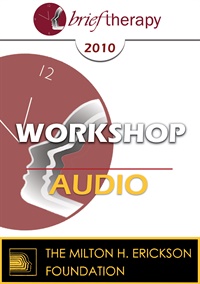
- Average Rating:
- Not yet rated
- Topic Areas:
- Hypnosis | Workshops | Positive Psychology | Mindfulness
- Categories:
- Brief Therapy Conference | Brief Therapy Conference 2010
- Faculty:
- Michael Yapko, PhD
- Duration:
- 2:11:10
- Format:
- Audio Only
- Original Program Date:
- Dec 12, 2010
- Short Description:
- This session explores the interface of mindfulness, hypnosis, and positive psychology as goal-oriented, experiential processes. Emphasizing acceptance, dissociation, and suggestibility, the workshop highlights how guided practices shape perception, regulate mood, and foster self-compassion. Participants learn practical strategies for utilizing suggestion, priming, and attentional focus to transform avoidance into resilience and to amplify clients’ inner resources in both therapy and everyday life .
- Price:
- $15.00 - Base Price
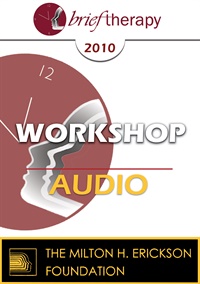
- Average Rating:
- Not yet rated
- Topic Areas:
- Meditation, Spirituality and Yoga | Workshops | Marriage | Mindfulness | Brief Therapy | Buddhism | Couples Therapy
- Categories:
- Brief Therapy Conference | Brief Therapy Conference 2010
- Faculty:
- Jon Carlson
- Duration:
- 2:51:00
- Format:
- Audio Only
- Original Program Date:
- Dec 12, 2010
- Short Description:
- Mindfulness is a deceptively simple way of relating to experience that has been successfully practiced for over 2500 years to alleviate human suffering and to increase awareness. Recently clinicians are discovering that mindfulness holds great promise as an add-on to couples therapy and education leading to greater kindness, love and acceptance. This program will discuss, demonstrate and offer experiential activities on how mindfulness can facilitate brief changes when working with couples.
- Price:
- $15.00 - Base Price
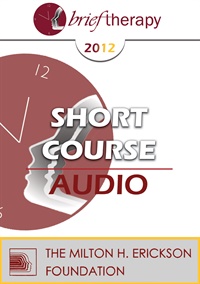
- Average Rating:
- Not yet rated
- Topic Areas:
- Hypnosis | Meditation, Spirituality and Yoga | Short Courses | Mindfulness | Buddhism | Hypnotherapy
- Categories:
- Brief Therapy Conference | Brief Therapy Conference 2012
- Faculty:
- Thomas Roberts
- Duration:
- 1:27:06
- Format:
- Audio Only
- Original Program Date:
- Dec 05, 2012
- Short Description:
- This Short Course will explore the reciprocal contributions between hypnotherapy and Buddhist/mindfulness meditation. Participants will learn how to incorporate the language of mindfulness (spaciousness, acceptance/ patience, openness, compassion) into the therapeutic/hypnotherapeutic practices, thus helping clients embrace the benefits that both have to offer.
- Price:
- $15.00 - Base Price
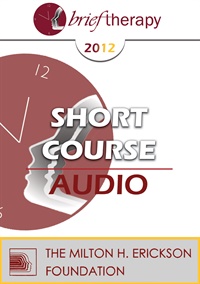
- Average Rating:
- Not yet rated
- Topic Areas:
- Trance | Trauma | Short Courses | Mindfulness | Brief Therapy | Ericksonian Hypnosis and Therapy Techniques
- Categories:
- Brief Therapy Conference | Brief Therapy Conference 2012
- Faculty:
- Ronald Alexander, PhD
- Duration:
- 1:29:32
- Format:
- Audio Only
- Original Program Date:
- Dec 09, 2012
- Short Description:
- This short course gives clinicians a hands-on look at using mindfulness and hypnotic awareness to settle agitation and restore clarity. Through live exercises and rapid grounding methods, participants see how breath, sensory focus and gentle redirection can interrupt overstimulation and help clients find steadier internal footing. The session centers on practical skills that translate easily to brief sessions or crisis moments.
- Price:
- $15.00 - Base Price
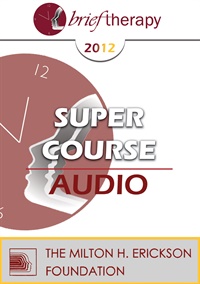
- Average Rating:
- Not yet rated
- Topic Areas:
- Depression | Hypnosis | Super Courses | Experiential Therapy | Mindfulness | Brief Therapy
- Categories:
- Brief Therapy Conference | Brief Therapy Conference 2012
- Faculty:
- Michael Yapko, PhD
- Duration:
- 4:42:27
- Format:
- Audio Only
- Original Program Date:
- Dec 09, 2012
- Short Description:
- The cutting edge of rapidly expanding scientific evidence highlights that the more we learn about the biology of depression, the more important psychology and social experiences become in shaping recovery on all levels. Participants will learn to utilize therapy as a social process that can teach clients skills experientially in order to reduce and even prevent depression. Interventions involving skill building homework assignments, and experiential methods of hypnosis and mindfulness will be considered in depth through group hypnosis and at least one skill-building exercise.
- Price:
- $15.00 - Base Price
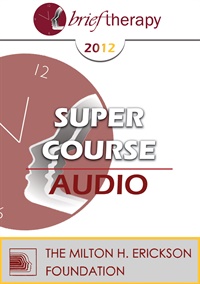
- Average Rating:
- Not yet rated
- Topic Areas:
- Psychotherapy | Super Courses | Tailoring | Mindfulness
- Categories:
- Brief Therapy Conference | Brief Therapy Conference 2012
- Faculty:
- Ronald Siegel, PsyD
- Duration:
- 4:40:35
- Format:
- Audio Only
- Original Program Date:
- Dec 09, 2012
- Short Description:
- BT12 Super Course 03 – Harnessing Mindfulness: Tailoring the Practice to the Problem – Ronald Siegel, PsyD Mindfulness-based psychotherapy is the most popular new treatment approach in the last decade—and for good reason. Mindfulness practices hold great promise both for our own personal development and as remarkably powerful tools to augment virtually every form of psychotherapy. Mindfulness is not, however, a one-size-fits-all remedy. In this workshop you’ll learn how mindfulness practices work to alleviate psychological distress, and how to creatively tailor them to meet the needs of diverse people and conditions. We’ll examine how to use mindfulness practices to help resolve disorders such as anxiety, depression, and stress-related medical problems, while enriching and enlivening therapeutic work.
- Price:
- $15.00 - Base Price
Tags: Mindfulness
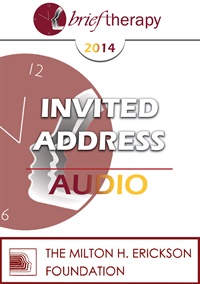
- Average Rating:
- Not yet rated
- Topic Areas:
- Happiness | Invited Addresses | Mindfulness | Brief Therapy | Buddhism
- Categories:
- Brief Therapy Conference | Brief Therapy Conference 2014
- Faculty:
- Ronald Siegel, PsyD
- Duration:
- 1:00:54
- Format:
- Audio Only
- Original Program Date:
- Dec 14, 2014
- Short Description:
- Everyone wants to be happy. While clinicians and researchers traditionally focused on helping troubled people feel less distressed—moving from -5 to 0 on the happiness scale—more recently they’ve branched out to investigate what actually leads to enhanced well-being. Some research findings point in surprising new directions, while others echo advice heard from wise elders and religious teachers across cultures and centuries.
- Price:
- $15.00 - Base Price
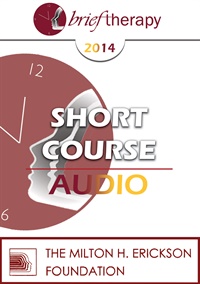
- Average Rating:
- Not yet rated
- Topic Areas:
- Short Courses | Experiential Therapy | Brief Therapy | Meditation, Spirituality and Yoga | Mindfulness
- Categories:
- Brief Therapy Conference | Brief Therapy Conference 2014
- Faculty:
- Susan Pinco, PhD
- Duration:
- 1:34:55
- Format:
- Audio Only
- Original Program Date:
- Dec 11, 2014
- Short Description:
- This experiential seminar will lead attendees in an exploration of mindful silence and its role in the clinical encounter. Our journey will begin with a taste of both structured and unstructured silence followed by a discussion of how both are manifested, experienced, and potentially utilized in the clinical encounter. Research related to silence in psychotherapy and recent findings in neuroscience will help explain why silence is a key ingredient in effective transformational processes.
- Price:
- $15.00 - Base Price
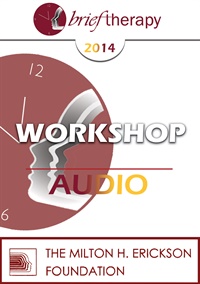
- Average Rating:
- Not yet rated
- Topic Areas:
- Workshops | Mindfulness | Intimacy | Couples Therapy | Relationships
- Categories:
- Brief Therapy Conference | Brief Therapy Conference 2014
- Faculty:
- Ronald Siegel, PsyD
- Duration:
- 1:54:20
- Format:
- Audio Only
- Original Program Date:
- Dec 12, 2014
- Short Description:
- Psychotherapists and clinical researchers are finding that ancient Eastern meditative techniques, originally solitary practices refined by hermits, monks, and nuns, are proving to be remarkably useful for facing interpersonal challenges. This workshop will explore how mindfulness meditation can help our clients and us develop the affect tolerance and capacity to be with and understand others that are critical for successful intimate relationships. You’ll leave knowing the three core elements of mindfulness practice, how to use mindfulness to react less personally to the inevitable ups and downs of interpersonal life, and how interpersonal mindfulness techniques can enhance therapeutic, romantic, and parent-child interaction.
- Price:
- $15.00 - Base Price
- Average Rating:
- Not yet rated
- Topic Areas:
- Psychotherapy | Clinical Demonstrations | Mindfulness
- Categories:
- Brief Therapy Conference | Brief Therapy Conference 2016
- Faculty:
- Ronald Siegel, PsyD
- Course Levels:
- Master Degree or Higher in Health-Related Field
- Duration:
- 1:00:05
- Format:
- Audio and Video
- Original Program Date:
- Dec 10, 2016
- Short Description:
- Clinicians are enthusiastically discovering that mindfulness practices can enlighten and enliven their lives, both inside and outside the therapy hour. These techniques hold great promise for personal development and as a powerful method to enhance virtually all forms of psychotherapy. But what does mindfulness-informed therapy actually look like? This demonstration, using volunteers from the audience, will illustrate how mindfulness practices and insights derived from them can inform treatment.
- Price:
-
Sale is $29.00
price reduced from Base Price - $59.00
Tags: Mindfulness Psychotherapy
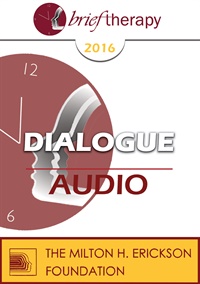
- Average Rating:
- Not yet rated
- Topic Areas:
- Attachment | Neuroscience | Psychology | Dialogues | Mindfulness | Buddhism
- Categories:
- Brief Therapy Conference | Brief Therapy Conference 2016 | Pioneers in Couples and Family Therapy
- Faculty:
- Ronald Siegel, PsyD | Stan Tatkin, PsyD, MFT
- Duration:
- 1:03:00
- Format:
- Audio Only
- Original Program Date:
- Dec 10, 2016
- Short Description:
- This presentation bridges mindfulness, Buddhist psychology, neuroscience, and attachment theory to deepen therapeutic work. It explains how mindfulness fosters awareness and self-regulation, while secure attachment provides emotional safety. Neurobiological insights—like cortical thickening and improved regulation—support the integration of these practices. Practical applications focus on using mindfulness and mutual regulation to enhance attunement and connection in couples therapy.
- Price:
- $15.00 - Base Price
- Average Rating:
- Not yet rated
- Topic Areas:
- Short Courses | Mindfulness | Habits | Brief Therapy | Psychotherapy
- Bundle(s):
- Learning Track - Mindfulness
- Categories:
- Brief Therapy Conference | Brief Therapy Conference 2016
- Faculty:
- Lawrence Peltz, MD
- Course Levels:
- Master Degree or Higher in Health-Related Field
- Duration:
- 1:30:12
- Format:
- Audio and Video
- Original Program Date:
- Dec 08, 2016
- Short Description:
- We all have habits, from seemingly harmless to life threatening. But how do they work? And what makes them so resistant to change? This workshop presents a simple model of four categories of experience—the benefits and costs of maintaining v. relinquishing a habit. This brief approach emphasizes mindfulness practice and works well with other psychotherapeutic methods.
- Price:
-
Sale is $29.00
price reduced from Base Price - $59.00
Credit available - Click Here for more information
- Average Rating:
- Not yet rated
- Topic Areas:
- Clinical Demonstrations | Mindfulness | Psychotherapy | Brief Therapy
- Bundle(s):
- Learning Track - Mindfulness
- Categories:
- Brief Therapy Conference | Brief Therapy Conference 2018 | Online Continuing Education
- Faculty:
- Ronald Siegel, PsyD
- Course Levels:
- Master Degree or Higher in Health-Related Field
- Duration:
- 1:02:29
- Format:
- Audio and Video
- Original Program Date:
- Dec 08, 2018
- Short Description:
- Clinicians are enthusiastically discovering that mindfulness practices can enlighten and enliven their lives, both inside and outside the therapy hour. These techniques hold great promise for personal development and as a powerful method to enhance virtually all forms of psychotherapy. But what does mindfulness-informed therapy actually look like? This demonstration, using volunteers from the audience, will illustrate how mindfulness practices and insights derived from them can inform treatment.
- Price:
-
Sale is $29.00
price reduced from Base Price - $59.00
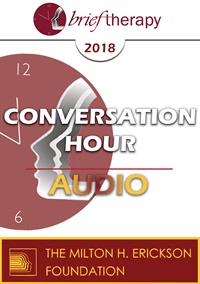
- Average Rating:
- Not yet rated
- Topic Areas:
- Great Conversations | Hypnosis | Mindfulness | Brief Therapy
- Categories:
- Brief Therapy Conference | Brief Therapy Conference 2018
- Faculty:
- Ronald Siegel, PsyD | Michael Yapko, PhD
- Duration:
- 1:00:08
- Format:
- Audio Only
- Original Program Date:
- Dec 08, 2018
- Short Description:
- This wide-ranging dialogue explores the intersections of mindfulness and hypnosis, weaving together clinical stories, research, and experiential insights. From transforming pain perception in brain imaging studies to reshaping rigid self-definitions in therapy, the conversation shows how each practice offers unique yet overlapping ways of fostering flexibility and resilience. Participants hear vivid examples of how language, suggestion, and attention shape identity, affect tolerance, and the capacity for change.
- Price:
- $15.00 - Base Price
Credit available - Click Here for more information
- Average Rating:
- Not yet rated
- Topic Areas:
- Short Courses | Brief Therapy | Trauma | Ericksonian Hypnosis and Therapy Techniques | Mindfulness | Pain and Healing | Somatic Experiences
- Categories:
- Brief Therapy Conference | Brief Therapy Conference 2018 | Online Continuing Education
- Faculty:
- Ronald Alexander, PhD
- Course Levels:
- Master Degree or Higher in Health-Related Field
- Duration:
- 1:31:13
- Format:
- Audio and Video
- Original Program Date:
- Dec 06, 2018
- Short Description:
- This course focuses on helping clients regain momentum after overwhelming experiences by using brief, body-centered interventions. Participants explore how curiosity, movement, and simple awareness practices can loosen rigid trauma responses and reopen access to choice. With an emphasis on resilience-building, the session offers straightforward tools for shifting clients out of collapse and back into a sense of possibility.
- Price:
-
Sale is $29.00
price reduced from Base Price - $59.00



